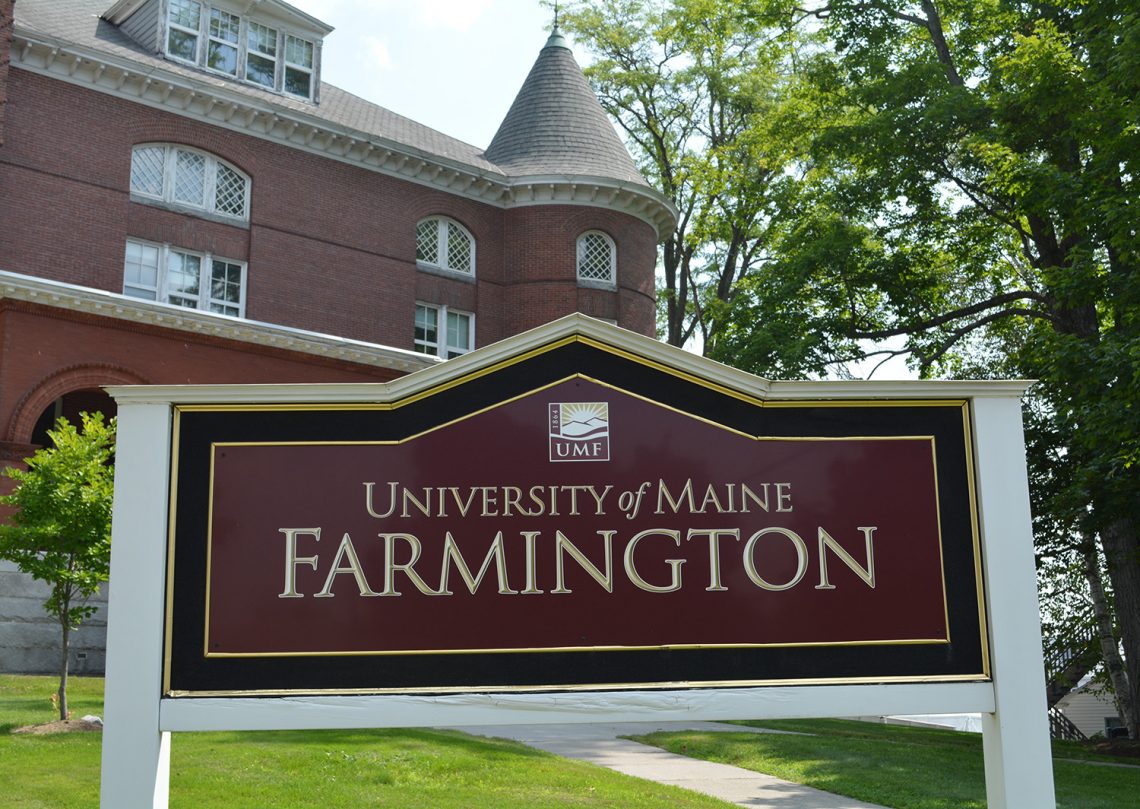FARMINGTON, ME (October 5, 2021)—The University of Maine at Farmington is proud to recognize Indigenous People’s Day 2021 with a weeklong series of events that will explore issues vital to the Wabanaki people, their relationship with the land and their culture. Events are free and open to the public.

UMF Merrill Hall
Monday, October 11 – Virtual Teach-In
In preparation for the UMF observance of Indigenous People’s Day, a Virtual Teach-In will offer three films. These are currently available for online viewing. These educational films are presented by the Bomazeen Land Trust, a non-profit founded and run by the Wabanaki people, and Sunlight Media Collective, an organization of Indigenous and non-Indigenous media makers and activists. The films include:
- The Penobscot: Ancestral River, Contested Territory
- The Saga Continues
- Kihtahkomikumon (Our Land) – #IslandBack In Passamaquoddy Territory
Links to these films can be found at: https://www.umf.maine.edu/diat/indigenous-peoples-week/
Wednesday, October 13, 11:45 a.m. – 1 p.m.
Emery Community Arts Center
Presentation: #LandBack, Water Rights and Decolonization in Wabanaki Territory
The Wabanaki people have been protecting their homelands, where UMF resides, since time immemorial, and continue to do so today. Wabanaki land-defenders and water protectors Dawn Neptune-Adams, Maria Girouard, Mali Omomsawin and Lokotah Sanborn will present on current water quality issues, waste mismanagement, land claims proceedings and the #LandBack movement. The speakers represent Penobscot and Abenaki communities and Wabanaki-led organizations.
Friday, October 15, 11:45 a.m. – 1 p.m.
Emery Community Arts Center
Presentation / Discussion: Decolonizing the University Through Placed-Based Agreements with Tribal Nations
Decolonization. What does it mean and require of us here at the University of Maine Farmington? Associate Professor of Anthropology and Chair of Native American Programs at the University of Maine Darren J. Ranco (Penobscot Nation) will lead a campus conversation about the decolonization movement in higher education, with an eye on establishing some action steps for us here at UMF. All are welcome — students, staff, and faculty.
UMF Indigenous Land and Water Acknowledgement: https://www.umf.maine.edu/about/indigenous/
More Information on Presenters:
Maria Girouard of Penobscot Nation is an historian with a particular interest and expertise in the Maine Indian Land Claims. A longstanding community organizer, educator and steward of the homelands, Maria has spoken extensively on topics including Penobscot history, the Maine Indian Land Claims, food justice and the current legal battle being waged over the Penobscots’ ancestral river. She is a co-founder of the Sunlight Media Collective and of The Peoples’ Garden on Indian Island. She has served her tribal community in the past as an elected member of Penobscot Tribal Council and director of the Penobscot Cultural and Historic Preservation Department. She holds a Master’s in History from the University of Maine and currently works as the Executive Director for the non-profit organization Wabanaki REACH.
Lokotah Sanborn is a Penobscot artist and community organizer for racial and environmental justice and Indigenous sovereignty. He is a member of Sunlight Media Collective, Needlepoint Sanctuary, Bomazeen Land Trust, Racial Equity and Justice and several other organizations dedicated to food security and mutual aid in marginalized communities. Lokotah will present on the #landback movement and the work of Bomazeen Land Trust across Maine and the northeast.
Dawn Neptune Adams is a member of the Penobscot Nation and a filmmaker with Sunlight Media Collective. Her grassroots environmental activist résumé began with protecting Indigenous Sacred sites in Huntington Beach, Calif., in 1998 and continues in the present with Indigenous advocacy at Penobscot Tribal, local, state and national levels.
Mali Obomsawin of Odanak Abenaki First Nation is an organizer and educator for racial justice and Indigenous sovereignty. She serves as the Executive Director of Bomazeen Land Trust and is a member of Sunlight Media Collective and Racial Equity and Justice. She is also a professional musician, touring internationally with her band Lula Wiles (Smithsonian Folkways Recordings) and as a side woman in various musical projects.
Darren Ranco is a faculty member in the Department of Anthropology at the University of Maine Orono, as well as the Chair of Native American Programs and Coordinator of Native American Research. His research focuses on the ways in which indigenous communities in the United States resist environmental destruction by using indigenous diplomacies and knowledge to protect cultural resources, and how state knowledge systems continue to expose indigenous peoples to an inordinate amount of environmental risk. Ranco is a member of the Penobscot Nation and is particularly interested in how better research relationships can be made between universities, Native and non-Native researchers, and indigenous communities.
# # #

